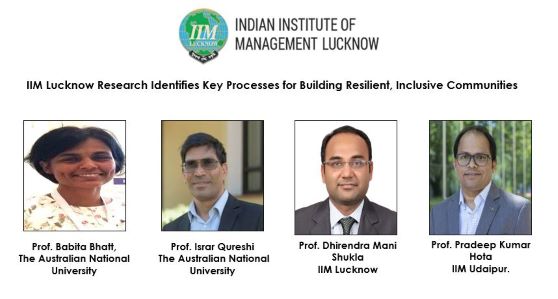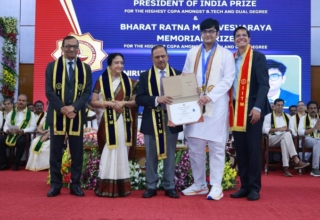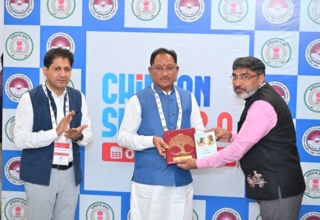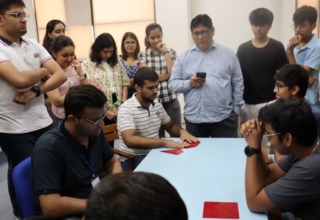
This pioneering study provides crucial insights into how marginalised communities can overcome entrenched inequalities and build sustainable, inclusive futures
A research study conducted by faculty at Indian Institute of Management Lucknow has highlighted the importance of empowering marginalized communities to overcome entrenched inequalities while preserving their autonomy in the face of external pressures.
This pioneering study is significant as it provides crucial insights into how marginalised communities can overcome entrenched inequalities and build sustainable, inclusive futures. It explores the transformative role of grassroots ‘Community Collectives’ (CCs) as viable alternatives to traditional top-down economic models, offering fresh insights into sustainable development and inclusive governance.
The study, published in Organization Studies, an esteemed FT-50 journal. Thee research was led by Prof. Babita Bhatt, and Prof. Israr Qureshi, from The Australian National University, along with Prof. Dhirendra Mani Shukla from IIM Lucknow and Prof. Pradeep Kumar Hota from IIM Udaipur. Their study investigates how community collectives are actively addressing issues of marginalization and shaping inclusive futures.
Elaborating on the key research findings, Prof. Dhirendra Mani Shukla, Assistant Professor, Strategic Management, IIM Lucknow, and one of the researchers of the study, said, “Our study provides a roadmap for building more resilient, sustainable, and inclusive communities. By strategically engaging with both internal cultural practices and external governance structures, marginalized communities can shape their own futures.”
The research offers a unique exploration of alternative organising models within marginalized, place-based communities, focusing on sustainable resource management and inclusive decision-making. It provides valuable lessons for other communities, policymakers, and organisations working to address social hierarchies and promote environmental sustainability.
Through a comparative case study of two Indian community collectives in Central India, the researchers highlight two crucial themes in grassroots organising: Projective Cultural Adjustment and Tempered Autonomy.
- ‘Projective Cultural Adjustment’examines how communities either adapt or move away from traditional practices to overcome challenges and achieve sustainable growth.
- ‘Tempered Autonomy’focuses on how marginalized communities negotiate their independence while carefully avoiding direct confrontation with dominant powers, both internal and external.
These themes offer critical insights into the strategies employed by community collectives in their pursuit of autonomy and resilience.
The study identifies three key processes of prefigurative organising that emerge within these communities:
- Pre-figuring Self-Governance – Establishing autonomous decision-making structures within the community.
- ‘Commoning’ – Collaborative management of shared resources such as water sources and community forests.
- Cultivating Discursive Spaces – Creating platforms for inclusive dialogue and decision-making.
These processes illustrate how community collectives navigate the complexities of marginalization, foster self-reliance, and simultaneously honor traditional values while adapting to external pressures.
The Key findings from the study include:
- Empowering Local Governance: The research demonstrates how marginalized communities can create autonomous, sustainable governance structures that address local challenges.
- Sustainable Resource Management:By developing common resources and fostering cooperation, these collectives offer practical models for managing natural resources sustainably.
- Inclusive Decision-Making: The study proposes new governance models that incorporate diverse perspectives, promoting social resilience and inclusivity.
The study offers practical models for sustainable resource management and inclusive governance, providing actionable lessons for policymakers and organizations. The research is globally relevant, offering solutions to address systemic inequalities and promote community empowerment, making it a valuable contribution to the field of sustainable development.
This research was supported by the IDRC Doctoral Research Award (#107473-99906075-074 to Prof. Babita Bhatt) and the Research Grants Council of Hong Kong (GRF Grants to Prof. Israr Qureshi and Prof. Babita Bhatt). The collaborative nature of this research underscores its global significance and its potential impact on the future of sustainable community development.









